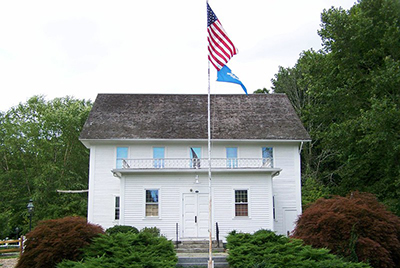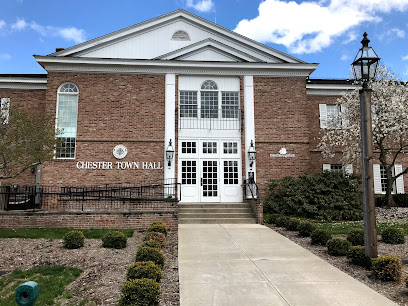Chester voters rejected the referendum to adopt the proposed Charter.
While this is not the outcome we had worked for, we have every confidence in Town Leadership to continue working together for what is best for Chester and its residents and to maintain the type of community where matters of public concern can be deliberated in ways that promote understanding.
We appreciate the work of the members of the Chester Governance Study Committee in bringing these ideas forward and the Chester Charter Commission in drafting a thoughtful proposal and keeping Chester’s future at the forefront of their discussions.
And our thanks to you for reading the Charter for Chester emails, engaging with this website and social media, and making an informed vote.
An Opportunity to Improve Our Local Government
Connecticut State Statutes provide a basic governance framework that all Connecticut municipalities must follow unless they adopt a charter. A Charter – similar to a state or national constitution – enables a municipality to set its own rules for governance and is designed to be customized to meet a town’s specific needs and interests.
Connecticut State Statutes can be restrictive, limiting opportunities and improvements for governing. While some of the changes can be made by administrative action or ordinance, a charter can best address the issues of continuity, complexity, and engagement that the Town has been experiencing over the last several years. Also, without a charter, future town officials could easily decide to change course, affecting the continuity and stability of government.
Chester is one of about fifty (50) remaining municipalities in Connecticut that still operate under State Statutes (2/3 of Connecticut’s 169 municipalities have a Charter). In 1973, Chester considered a Charter for many of the same reasons discussed today, but the next steps were never taken.


Charter Commission
In April 2023, Chester’s Board of Selectmen initiated a seven-member Charter Commission to address the issues identified by the Chester Governance Study Committee in its February 2023 report, including:
- The increasing complexity of Town government
- Challenges with the continuity of executive leadership
- Difficulty recruiting and maintaining professional staff
- Difficulty finding volunteers to serve and fill vacancies on boards and commissions
- Low Town Meeting participation and engagement
The Charter Commission completed its work in May 2024, and the current Board of Selectmen voted to send the Proposed Charter to referendum. This year, Chester Voters will have an important choice to make about whether to adopt the Proposed Chester Charter.
Proposed Chester Charter
The Proposed Charter retains Chester’s current Selectmen-Town Meeting form of government but shifts some of the decision-making to a larger Board of Selectmen. This creates a more efficient way to govern by simplifying the process for routine actions, such as creating a new board or commission and reserving the Town Meeting for major issues, such as the annual town budget meeting or town real estate matters.
Proposed Charter provisions include:
- Expanding the elected Board of Selectmen from 3 to 5 members to provide continuity and diverse viewpoints, resulting in better decision-making.
- Hiring a professional municipal manager – a Town Administrator – who would manage the day-to-day operations and administration of Town services and departments, reporting to the Board of Selectmen; the elected First Selectman retains authority as the Town’s Chief Executive Officer accountable to Chester Voters.
- Replacing the current 9-member Board of Finance with an elected 5-member Financial Accountability Board with similar duties and authority.
- Shifting the few remaining elected boards to appointed to better engage the 41% of Chester Voters not registered with a major political party.
- Changing the Town Clerk and Tax Collector positions from elected to appointed to recognize the specialization of these positions and the need for continuity.
- Increasing the terms of office for most town boards to a standard 4-year term.
- For 5- and 7-member boards, providing for more minority representation than what is prescribed by State Statutes.
The purpose of this website is to promote informational awareness of the town charter proposed for Chester. For more details, see the resource documents provided, including Frequently Asked Questions and informational videos.
Chester Town Talks: Q&A on the Proposed Chester Charter
On August 20th, First Selectman Cindy Lignar was joined by Selectman Pat Bandzes and Selectman Paul Radicci to share information and answer questions on the proposed Chester Charter.
Charter Conversations: Special Sessions
Town of Wilton
The Town of Wilton is one of the latest communities to add a Town Administrator to its Selectmen/ Town Meeting form of government, also a provision in the proposed Chester Charter.
While Wilton is a very different community than Chester, on July 22nd, we learned about the process Wilton used to transition to this form of government. Wilton’s new First Selectwoman, Toni Boucher, and Town Administrator Matt Knickerbocker, a state-wide respected municipal governance professional who has served in various communities in Connecticut, shared their experiences.
Town of Columbia
Columbia’s Town Administrator Mark Walter and First Selectman Steven Everett visited Chester for a special session of Charter Conversations. Mark and Steven discussed their respective roles and responsibilities and how they work together to govern the Town of Columbia.
Want to Stay Informed?
Have updates sent directly to your inbox.
Email Subscription Form
CHARTER FAQs
What is a Charter?
Your Subtitle Goes Here
Connecticut State Statutes provide a basic governance framework that applies to all Connecticut towns unless they adopt a charter. This framework may or may not address a town’s specific needs or goals, so a charter allows a town to customize its governance structure. A local charter is similar to a state or national constitution.
A town charter is a legal document that includes a municipality’s general laws. It establishes the organizational structure, as well as the powers, duties, and responsibilities of local government. Further, it includes the handling of public services and financial matters, such as the power to tax and to incur debt (bond). The charter also provides information regarding the town’s “agencies” (boards, commissions, and committees).
Chester is one of about fifty (50) remaining municipalities in Connecticut that still operate under State Statutes since we do not have a Charter (2/3 of Connecticut’s 169 municipalities have a Charter). In 1973, Chester considered a Charter for many of the same reasons being discussed today, but the next steps were never taken.
What are the advantages of having a Charter?
Your Subtitle Goes Here
A Charter enables a municipality to set its own rules for governance and is designed to be customized to meet a town’s specific needs and interests. Connecticut State Statutes can be restrictive, limiting opportunities and improvements for governing. While some of the changes in the Proposed Charter can be made by administrative action or ordinance, a charter can best address issues of continuity, complexity, and engagement that the Town has been experiencing. Also, without a charter, future town officials can easily decide to change course, affecting the continuity and stability of government.
Is the Proposed Charter less democratic? Am I losing my right to vote?
Your Subtitle Goes Here
It is the opposite. The Proposed Charter preserves the Town Meeting but shifts some of the balance to a shared authority between the Board of Selectmen and the Town Meeting based on complexity and importance. This creates a more efficient way to govern by simplifying the approval process for routine actions. An example is the adoption of a non-controversial administrative action, such as approving a town ordinance to create or change the size of a board or commission. Town Meetings will continue to be held for Voters to decide on major issues, such as approval of the Annual Town Budget, real estate matters, certain town ordinances, and other actions defined in the Charter. The Region 4 education budget will continue to be voted on separately in a district-wide referendum.
With the Proposed Charter, 5% of Chester Voters can petition for a Town Meeting to overrule an action of the Board of Selectmen, such as ordinances, resolutions, or other actions taken. Also, the Charter provides options for the Board of Selectmen to call a Town Meeting if the Financial Accountability Board (formerly, Board of Finance) rejects the Board of Selectmen’s recommendations for Additional Appropriations, Contingency Account transfers, or Capital Improvement Program related transfers, something not possible today. These features provide an added layer of opportunity for Chester voters to make their voices heard and to vote on town priorities.
Under the Proposed Charter, who runs the Town?
Your Subtitle Goes Here
The Proposed Charter provides for the Board of Selectmen to appoint a full-time professional municipal manager — a Town Administrator serving as the Chief Administrative Officer — to assist the First Selectman and Board of Selectmen. The Town Administrator will be supervised by and reports through the First Selectman to the Board of Selectmen. The Town Administrator will manage the day-to-day operations and administration of Town services and departments, a role currently performed by the First Selectman. He or she will implement Board of Selectmen policies and ensure that the Town runs efficiently and effectively. The First Selectman will remain the Chief Executive Officer, but the position will be relieved of daily management responsibilities (with a reduction in salary reflecting the change in responsibilities). This separation of roles allows the First Selectman and Board of Selectmen to focus on collaborative planning and strategy, policy-making, oversight of town government, and more.
